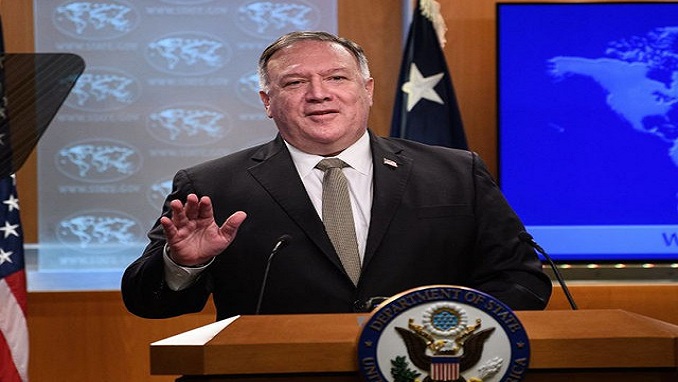U.S. Secretary of State Mike Pompeo announced Monday that his department would return Cuba to its list of State Sponsors of Terrorism over the Castro regime’s ties to international terrorist organizations like Hezbollah and the Revolutionary Armed Forces of Colombia (FARC), Al Jazeera reports.
The Castro regime — which regularly imprisons Cuban citizens for crimes such as “disrespect” if caught speaking ill about the government in public — also openly harbors violent American criminals, most prominently Joanne Chesimard, who killed a New Jersey State Trooper in 1973.
After decades on the list — since 1982 — President Barack Obama removed Cuba from the official State Department list of State Sponsors of Terrorism in 2015, claiming the evidence did not support a place for the regime on that list. At the time, Cuba shared the list with Iran, Syria, North Korea and Sudan; the administration of President Donald Trump removed Sudan from the list in 2020.
Since Obama’s decision to remove Cuba, reports have repeatedly indicated that Cuba has direct ties to the Shiite jihadist organization Hezbollah, including reports linking Cuban funding to the creation of Venezuelan passport machines that ultimately created fraudulent documentation for Hezbollah members from the Middle East.
The Castro regime has also never hidden its support for the FARC, a Marxist terrorist organization, including allowing prominent FARC leaders to march in its parades after Obama removed it from the state sponsors of terrorism list.
In announcing the designation Monday, Pompeo said in a statement that the move was necessary in light of the Communist Party of Cuba “repeatedly providing support for acts of international terrorism in granting safe harbor to terrorists.”
“The Trump Administration has been focused from the start on denying the Castro regime the resources it uses to oppress its people at home, and countering its malign interference in Venezuela and the rest of the Western Hemisphere,” Pompeo noted.
Countries on the list of state sponsors of terrorism are subject to “restrictions on U.S. foreign assistance; a ban on defense exports and sales; certain controls over exports of dual use items; and miscellaneous financial and other restrictions,” according to the State Department.
Obama’s decision to strip Cuba of those sanctions followed an announcement in 2014 that his administration would actively court the Castro regime through economic incentives in the hopes of convincing it to improve its human rights record.
Obama personally visited Havana in 2016 and met with Raúl Castro, attending a baseball game and doing “the wave” together. The Obama policies resulted in skyrocketing numbers of politically motivated arrests fueled by American celebrity tourism to Havana.
Tourism to Cuba by U.S. citizens is technically illegal, but under Obama celebrities could claim a “people to people” exception to the ban to enjoy Cuba’s hospitality and entertainment offerings, almost universally owned by the Cuban military. Obama also legalized cruises to Cuba, which would necessarily use ports stolen from American citizens to dock there, without paying the true owners.
When the Obama State Department announced the removal of Cuba from the State Sponsors of Terrorism list in 2015, the Castro regime was heavily involved in negotiations between the FARC and the Colombian government, on behalf of the terrorist organization.
Cuba played a significant role as mediator in those talks, which resulted in a “peace deal,” rejected by the Colombian people, that legalized the FARC and allowed its senior leaders to receive uncontested Colombian Senate and House seats without fully abandoning terrorist activities or facing prison time for their crimes.
As of 2020, several senior FARC “senators” have declared war on Colombia once again and are believed to be hiding out in Venezuela, which is almost fully controlled by the Cuban communist regime. Current Colombian President Iván Duque accused Cuba in 2019 of helping Marxist terrorists who bombed a police station in Bogotá — this time not believed to be members of the FARC but of the Marxist terrorist rival, National Liberation Army (ELN).
The Castro regime, a prominent ally of terrorist Iran, is also believed to have close ties to Hezbollah, which also operates in Venezuela.
In 2016, U.K.-based outlet Asharq Al-Awsat accused Cuba of bankrolling a scheme for Venezuela to issue authentic government passports to members of Hezbollah who had never been to Venezuela and had no ties to the country. Two months after that report, the “Panama Papers,” a series of leaks from the now-defunct international firm Mossack Fonseca published by the International Consortium of Investigative Journalists (ICIJ), appeared to confirm the allegation.
The “Panama Papers” revealed that, under Hugo Chávez, Venezuela purchased advanced technology to overhaul the Venezuelan passport system. Chávez reportedly convinced the Cuban government to help, but given sanctions on Havana, Mossack Fonseca had to employ a money scheme known as a “financial bicycle” to obscure the origin of the cash.
By the time the Panama Papers were published, at least one Venezuelan diplomat, Misael López Soto of the Baghdad embassy, confirmed that the embassy was selling passports, birth certificates, and other legal documentation to non-Venezuelan Middle Eastern citizens in exchange for bribes, many of them believed to have ties to jihadist groups.
Last year, the Castro regime forced citizens to sign a “condolence book” in the aftermath of a U.S. airstrike against Qasem Soleimani, the head of Iran’s Islamic Revolutionary Guard Corps (IRGC) Quds Force. The IRGC is a U.S.-designated terrorist organization.
